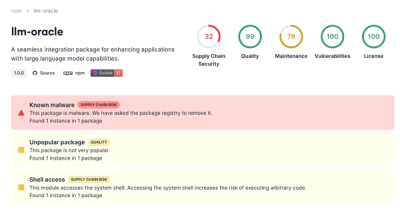
Security News
Python Overtakes JavaScript as Top Programming Language on GitHub
Python becomes GitHub's top language in 2024, driven by AI and data science projects, while AI-powered security tools are gaining adoption.
@matterlabs/hardhat-zksync
Advanced tools
zkSync Era Hardhat plugin provides a convenient method for bundling and accessing a range of zkSync-related Hardhat plugins.
Ensure you are using the correct version of the plugin with ethers:
For plugin version <1.0.0:
For plugin version ≥1.0.0:
To install hardhat-zksync plugin, run:
npm i -D @matterlabs/hardhat-zksync
or
yarn add -D @matterlabs/hardhat-zksync
Here is an overview of the plugins currently available in this package when installed:
| 🔌 Plugin | 📄 Description |
|---|---|
| hardhat-zksync-solc | Simplifies compiling Solidity contracts for the zkSync network, streamlining deployment preparation. |
| hardhat-zksync-deploy | Facilitates the deployment of contracts on zkSync, utilizing artifacts from hardhat-zksync-solc. |
| hardhat-zksync-verify | Automates the process of verifying smart contracts on the zkSync network, enhancing transparency and trust. |
| hardhat-zksync-upgradeable | Enables easier deployment and upgrading of smart contracts on the zkSync network, improving contract lifecycle management. |
| hardhat-zksync-node | Convenient plugin to run the zkSync era-test-node locally. |
| hardhat-zksync-ethers | A zksync-ethers SDK wrapper providing additional methods for accelerated development on zkSync. |
This plugin enables access to all commands available for each specific plugin, making them readily accessible with just the usage of this plugin. To view the available commands and their descriptions, please refer to the documentation for each individual plugin.
For certain tasks present in the plugins encompassed by this plugin, it overrides them with new features and parameters. These tasks streamline common functionalities into a simplified workflow.
Here is a list of overriden tasks where this plugin adds new optional parameter --verify:
deploy-zksync:contractdeploy-zksync:proxyupgrade-zksync:proxydeploy-zksync:beaconupgrade-zksync:beaconThe --verify parameter allow the task to immediately verify all deployed and upgraded contracts when task is called.
To check other parameters present in these tasks, please check the documentation pages for hardhat-zksync-deploy and hardhat-zksync-upgradable.
In addition to the hardhat-zksync, zkSync's Era website offers a variety of resources including:
Guides to get started: Learn how to start building on zkSync Era.
Hardhat zkSync Era plugins: Overview and guides for all Hardhat zkSync Era plugins.
Hyperscaling: Deep dive into hyperscaling on zkSync Era.
Contributions are always welcome! Feel free to open any issue or send a pull request.
Go to CONTRIBUTING.md to learn about steps and best practices for contributing to zkSync hardhat tooling base repository.
zkSync Era Discord server: for questions and feedback.
Follow zkSync Era on Twitter
FAQs
ZKsync bundle of Hardhat plugins
The npm package @matterlabs/hardhat-zksync receives a total of 992 weekly downloads. As such, @matterlabs/hardhat-zksync popularity was classified as not popular.
We found that @matterlabs/hardhat-zksync demonstrated a healthy version release cadence and project activity because the last version was released less than a year ago. It has 0 open source maintainers collaborating on the project.
Did you know?

Socket for GitHub automatically highlights issues in each pull request and monitors the health of all your open source dependencies. Discover the contents of your packages and block harmful activity before you install or update your dependencies.

Security News
Python becomes GitHub's top language in 2024, driven by AI and data science projects, while AI-powered security tools are gaining adoption.

Security News
Dutch National Police and FBI dismantle Redline and Meta infostealer malware-as-a-service operations in Operation Magnus, seizing servers and source code.

Research
Security News
Socket is tracking a new trend where malicious actors are now exploiting the popularity of LLM research to spread malware through seemingly useful open source packages.